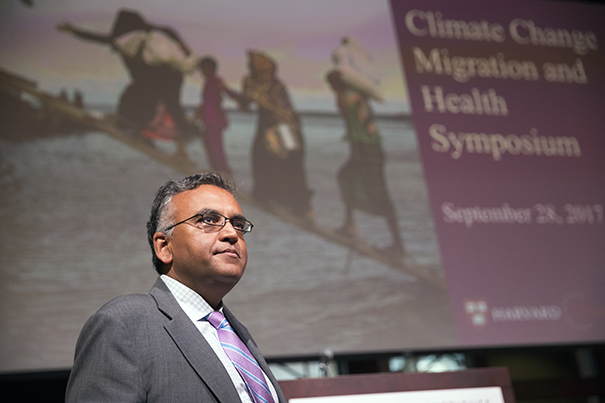Another climate change concern: Forced migration
Increasingly, links seen between those two compelling concerns, analysts say
Climate change is a “risk factor” for forced migration, like in the European refugee crisis, experts on health, migration, and disaster relief told a symposium Thursday, urging development of early warning systems and robust government responses to ease the effects of climate-related problems.
Jennifer Leaning, the Francois-Xavier Bagnoud Professor of Health and Human Rights at the Harvard T.H. Chan School of Public Health, said that, although controversial in the 1990s, the idea that climate change can play a role in sparking mass migrations like the those in the world today has become more widely accepted.
The extent of climate change’s contribution to the 66 million people on the move globally remains imprecise, but several experts said it is nonetheless important to include it in analyses of why people emigrate, what happens to them during their journeys, and how that affects their health.
Ashish Jha, K.T. Li Professor of International Health and director of the Harvard Global Health Institute, described climate change’s impact on migration as akin to the effects of smoking and heart disease. It’s known that smoking is a risk factor for heart disease, but its contribution to any particular case compared with other factors, like diet, exercise, and heredity, is difficult to quantify. That doesn’t prevent physicians from warning against cigarettes, however.
Scientists predict that climate change will not just warm the planet but also foster weather extremes, intensifying storms, and thereby making crop-killing droughts and flooding rains more common, heat waves hotter and longer, and sea levels high enough to threaten coastal dwellers, particularly during extreme tides such as those during hurricanes and other coastal storms.
Leaning, director of the FXB Center for Health and Human Rights, said that good governance is a major mitigating factor in climate shifts, though she also said even countries like the United States, that have both wealth and effective governments, are at risk for the most extreme storms, like hurricanes Harvey, Irma, and Maria. The torrential, enduring rains from Harvey, she said, overwhelmed even Houston’s modern, effective governance, while Maria’s impact on the Puerto Rico, a U.S. territory, could lead to significant migration to the mainland.
Leaning cited media reports that indicated thousands of Puerto Ricans had escaped to the mainland before the storm and that Maria’s destruction had so affected basic needs such as food, shelter, and employment that tens of thousands more — possibly even hundreds of thousands — could follow.

Unlike other parts of the world, where the mass migration of one ethnic group can cause competition for resources and foster ethnic tension, in this case, she said, the U.S. East Coast is wealthy and has an existing Puerto Rican population, so she didn’t expect the influx to become a strain on the whole economic and governmental system.
Leaning made her comments during a keynote talk at a half-day symposium called “Climate Change, Migration and Health” and sponsored by the Harvard Global Health Institute. The event, held at the Radcliffe gymnasium, also featured panel discussions on the topic and remarks by Jha.
Leaning said that climate issues likely played a part in sparking the ongoing European refugee crisis, through a prolonged drought in northern Syria that devastated the agricultural livelihood of people there. Its effects were exacerbated by an inadequate government response that caused a million Syrians to migrate internally to cities where the majority population was ethnically different. Those cities, already stressed by the arrival of 1.5 million refugees from Iraq, were also the sites for rising unrest that led to Syria’s civil war, which caused millions to flee the country.
More like this
Under current international law, Leaning said, those leaving their homelands for environmental reasons wouldn’t be considered refugees, a legal status reserved for those driven out because of race, religion, nationality, or politics. The label also doesn’t cover the many millions displaced from their homes who don’t cross international borders, but who nonetheless need help.
Economic and organizational pressures stemming from the new arrivals can foster local unrest and even conflict. Warfare confined to a single country is particularly worrisome because it isn’t regulated by international strictures and is more prone to atrocities such as ethnic cleansing, war crimes, and genocide, Leaning said.
“I won’t go into the way in which the world is awash with wars, and awash with weapons, and awash with young people who don’t have a sense of the future. We all know and understand this,” Leaning said. “It’s quite a direct link” to climate change. “It’s not the only link, and it’s not causal link, but there are associations between climate change, migration, entering alien spaces, conflict in those alien spaces, and then armed conflict.
“We’re very much concerned with how you prevent these wars, which is why we’re cycling back to climate change.”
Early warning systems, Leaning said, can give governments and international actors a chance to intervene before a dispute turns hot. Famine early warning systems are most advanced, and others — such as identifying atrocities — are being developed.
Health care, human migration, and climate change are critical international concerns, Jha said. Health care constitutes a significant part of the U.S. economy. Migration has fed reactionary movements that, among other things, just led to election of far-right members to the German parliament for the first time since World War II. In addition, he said, the United States has just witnessed three major storms, each large enough to be historic in its own right, in line with climate predictions that they will become more frequent and intense.
“Climate change is already beginning to have an effect,” Jha said. “By all measures, it’s only going to get worse.”
The panelists discussed care for migrants and the need for action, even amid continued uncertainty about what moves will prove most effective. Elizabeth Donger, a research associate at the FXB Center for Health and Human Rights at the Harvard T. H. Chan School of Public Health, said it’s important to think hard about what happens to refugees when they arrive in their new homes. The practice of sending people to temporary camps is reflective of an expectation that their stay will also be temporary, which experience says is hardly always the case, Donger said.
Statistics show that the typical stay of a refugee is 26 years, which makes it important that host nations don’t just warehouse them and instead provide education, job training, and work permits that allow them to become productive members of society.
Harvard Humanitarian Initiative Director Michael VanRooyen, professor of emergency medicine and of global health and population, and director of the Emergency Department at Brigham and Women’s Hospital, said the impact of climate-related disasters will likely fall most heavily on the world’s poorest nations, which lack the resources of countries like the United States to respond.
“We know there’s a direct link between the impact of disasters and human vulnerability,” VanRooyen said.
Though more study is needed to understand better the climate-related risks to health — whether through famine, war, or storms — VanRooyen warned that uncertainty is not an excuse for inaction. Centuries of experience, after all, have shown where disasters are most likely to hit.
“We work pretty closely with the Philippines, for example, and we know, predictably, the Philippines is going to be hammered by 25 major storms a year, and two or three of them will be epic in nature,” VanRooyen said. “Just because we’re uncertain doesn’t mean we shouldn’t act. Just because we can’t quantify it doesn’t mean it’s not real.”






